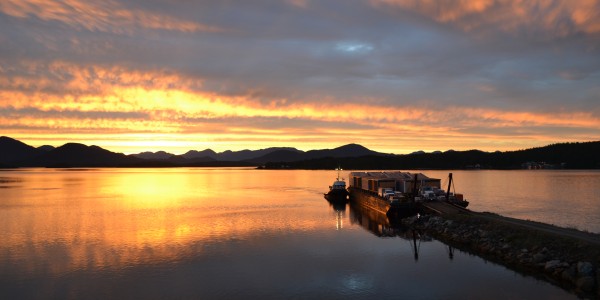Bella Bella’s ‘innovative’ new staff housing makes headlines in the Vancouver Sun
The new Vancouver Coastal Health staff housing in Bella Bella, which opened in the fall of 2015, is making headlines for its innovative, cost-effective approach to building. The Vancouver Sun published a story today (February 25, 2016) on the project, praising it for its energy efficiency and Passive House certification.
The six-plex housing units, which were barged in from the Lower Mainland and assembled onsite, were needed for the R.W. Large Memorial Hospital staff after a fire destroyed the original staff housing in 2014.
Read the Vancouver Sun story online or below:
Bella Bella project delivers high-efficiency housing

Modules for a six-unit townhouse development in Bella Bella, manufactured by Britco for project developer Spani Developments and consultants Red Door Energy Designs. Vancouver Coastal Health commissioned the project, which provides staff housing for the R.W. Large Memorial Hospital.
Photograph by: Jaden Nyberg/Vancouver Sun
To an outsider, the project to replace staff housing for Vancouver Coastal Health in Bella Bella sounds audacious: Manufacture the modular six-unit complex at a factory in Agassiz, ship it by barge to the remote coastal community to be assembled, and start moving in employees within a span of seven months.
On top of that, construct it to the highly energy-efficient Passive House building standard, a method that, in urban areas, comes with a premium in capital costs to be weighed against longer-term savings in utility costs from smaller heating bills.
The project team that won the job not only managed all this, they built the units for $2.6 million, about $500,000 less than it would have cost to construct the development on site, said Monte Paulsen, the group’s Passive House energy consultant.
With what the parties involved have learned, Paulsen is holding it out as an example that can be repeated in other remote locations, particularly First Nations communities, where substandard housing is a huge problem and energy costs are a major concern.
And working with modular builders, he added that Passive House construction could become a major high-value, made-in-B.C. export.
On Wednesday, Paulsen, a principal with the firm Red Door Energy Design, presented the project, along with Craig Mitchell, director of sales for Britco, the modular-construction firm on the development, as a case study at the Buildex construction-sector trade show in Vancouver.
“It’s expensive compared to a Surrey townhouse,” Paulsen said in an interview, noting that construction costs for a similar project in the Lower Mainland would be about half the cost.
“But it’s cheap compared to remote sites like Bella Bella,” Paulsen added, where housing prices are inflated from the transportation costs of shipping in all the materials and housing construction crews for extended periods.
And using 75-per-cent less energy, and 80-per-cent fewer greenhouse gas emissions from consuming less heating fuel, Paulsen said the Passive House design delivers Vancouver Coastal Health considerable savings.
This project turned out to be the first completely modular, multi-unit Passive House building in Canada, and Paulsen said its timeline helped drive the approach their team took.
Fire damaged a block of staff housing in the fall of 2014, and it needed to be replaced quickly.
Paulsen said Vancouver Coastal Health put out a request for proposals on Christmas Eve, with a short window to respond.
“Huge credit to Vancouver Coastal Health,” said Paulsen, for taking the leap to put out the request to see if proposals could deliver what they were looking for.
Sechelt-based builder Spani Developments signed on as the general contractor, with architects Mobius Architecture and engineers RDH.
And Britco jumped at the chance to get involved as the manufacturer for the modular units, before its staff even knew much about what Passive House entails.
“It was definitely an innovative project,” said Mitchell, and it opened the company up to potential new markets in high-efficiency, environmentally friendly construction. The timing was also opportune for Britco, which has been hit by the downturn in Canada’s energy industry.
Paulsen said the team submitted a proposal in January, and by March they knew they had the job. Under tight timelines, they started to simultaneously prepare the site in Bella Bella and manufacture the buildings in Agassiz.
Finished modules were trucked to Mission where they were loaded on barges for the 700-kilometre journey to Bella Bella for installation.
By the end of September, Paulsen said the first residents were moving in.
While this project wasn’t built directly for a First Nation community, Paulsen said his firm and Britco have been in discussions with First Nations elsewhere about other potential projects.
He added that B.C. Housing has also stepped into the fray by issuing an request for proposals for seniors housing in Smithers with similar objectives.
Twitter.com/derrickpenner

